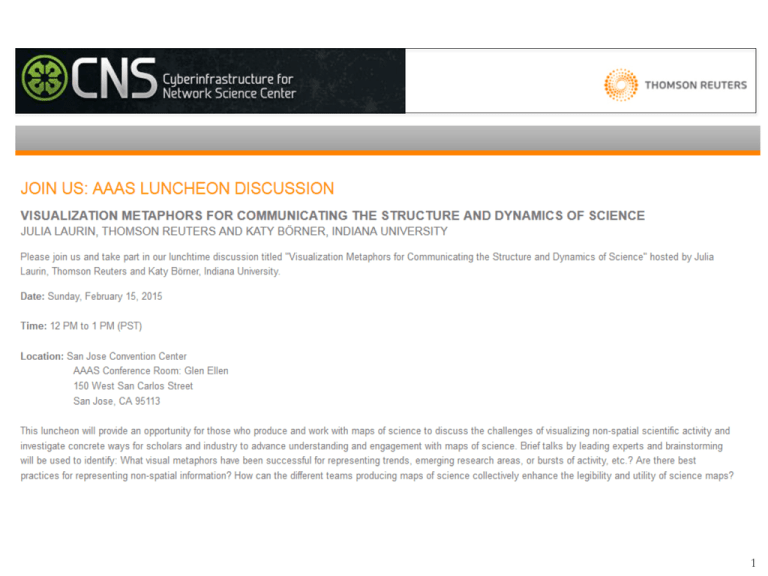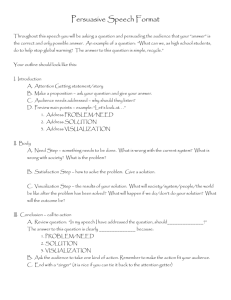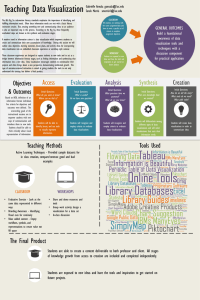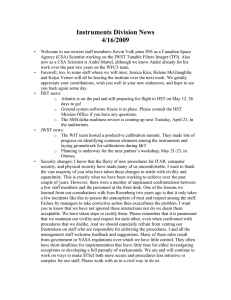
1
Agenda
Welcome by Julia and Katy
Setting the Stage:
Visual Languages: Industry Pull
by Julia Laurin, Thomson Reuters
Visualization Frameworks: Academic Push
by Katy Börner, Indiana University
Invited Talk:
Visualizing Knowledge Spaces: Cartographic Perspectives
by Dr. André Skupin, Geography, San Diego State University
Discussion
2
Visual Languages: Industry Pull
by Julia Laurin, Thomson Reuters
3
Visualizing Across Domains:
Lessons Learned
Intellectual Property
Life Sciences
Scholarly Research
Thomson Data Analyzer
Cortellis Data Fusion
Web of Science
• Support multiple
approaches to data
• User-driven and use case
driven
4
• Balancing transparency
and usability
Graph Analytics:
Answering the Big Questions
Mission: Research and develop solutions which support graph data, analytics and
machine learning at big data scales
How do we provide research funders with areas of
research on the verge of developing into new fields
and worthy of deeper funding?
graph community detection and prediction
How do we provide scientific researchers with a topic
hierarchy for research discovery which remains
current w/rt recently published articles?
graph-based topic generation and clustering
How do we provide university administrators with
aggregation tools that effectively disambiguate
entities like people and organizations?
graph-based pattern matching
Getting from Table to Graph
37,225,696 publications
602,346,147 total citations
6
Mapping Science Requires a lot of
Choices
•
•
•
•
•
•
•
Insight needed
Types of analysis
Levels of analysis
Data scale types
Visualization types
Graphic symbol types
Level of interactivity
7
Uncharted Territory – Together
•
•
•
•
Visual perception and cognition
Power of big computing
Sheer complexity of data
Interactive and 3D gamification
8
Visualization Frameworks: Academic Push
by Katy Börner, Indiana University
9
De-Facto Standardization of Science Basemaps
10
11
How to Classify Different Visualizations?
By
• User insight needs?
• User task types?
• Data to be visualized?
• Data transformation?
• Visualization technique?
• Visual mapping transformation?
• Interaction techniques?
How to support the design of effective
visualizations by experts and citizen scientists?
12
Study
See page 5
13
Workflow Design
See page 24
14
Types
relevant for the design of effective visualizations
See page 24
15
See page 26
16
Types
relevant for the design of effective visualizations
See page 30
17
Visualization Types (Reference Systems)
1. Charts: No reference system—e.g., Wordle.com, pie charts
2. Tables: Categorical axes that can be selected, reordered; cells
can be color coded and might contain proportional symbols.
Special kind of graph.
3. Graphs: Quantitative or qualitative (categorical) axes.
Timelines, bar graphs, scatter plots.
4. Geospatial maps: Use latitude and longitude reference
system. World or city maps.
5. Network graphs: Node position might depends on node
attributes or node similarity. Tree graphs: hierarchies,
taxonomies, genealogies. Networks: social networks,
migration flows.
18
Types
relevant for the design of effective visualizations
See page 25
19
See page 36
20
http://scimaps.org/atlas2
21
http://ivmooc.cns.iu.edu
22
Invited Talk:
Visualizing Knowledge Spaces: Cartographic Perspectives
by Dr. André Skupin, Geography, San Diego State University
23
3/1/2015
André Skupin
Professor of Geography
San Diego State University
Founder & Co‐Director Center for Information Convergence and Strategy
C
t f I f
ti C
d St t
San Diego State University
Associate Director
Center for Entrepreneurship and Innovation
University of Dubai
Co‐Founder & Co‐CEO
BigKnowledge LLC
What is Visualization?
Cartographic Lesson I: “Space – The Final Frontier”
Cartographic Lesson II: “It’s all been done before!”
The Power of Spatial Concepts
Gallery of Base Maps
Visualization for Impact: Partners, Cultures, Values
Partners Cultures Values
Copyright holders: André Skupin, bigknowledge.net, and others. All rights reserved.
1
3/1/2015
“Visualization is a data‐driven representation aimed at amplifying cognition, frequently supported by computation and interactivity.”
Copyright holders: André Skupin, bigknowledge.net, and others. All rights reserved.
2
3/1/2015
See: http://scimaps.org/
Geographic Space
Discrete objects
Continuous fields
Vector Space
Entities
Properties
Network Space
Nodes
Links
Knowledge Space
Domains
Actors
Concepts
Artifacts
Copyright holders: André Skupin, bigknowledge.net, and others. All rights reserved.
3
3/1/2015
y
g
Data Symbols Understanding
Scale & Abstraction
Semantic Zooming
Base Map Creation
Base Map Use
Thematic Overlays
Truth in Mapping
visual | graphic | semiotic variables
for static maps
Bertin (1967/1983)
▪ seven variables ▪
▪
▪
▪
▪
▪
▪
Position
Size Value
Texture
Hue
Orientation
Shape
Copyright holders: André Skupin, bigknowledge.net, and others. All rights reserved.
4
3/1/2015
visual | graphic | semiotic variables
for static maps
Bertin+
▪ eight variables
▪
▪
▪
▪
▪
▪
▪
▪
size
value
saturation
pattern texture
pattern arrangement
hue
orientation
shape
visual | graphic | semiotic variables
for static maps
Bertin+
▪ quantitative data
▪
▪
▪
▪
size
value
saturation
pattern texture
▪ qualitative data
▪
▪
▪
▪
pattern arrangement
hue
orientation
shape
Copyright holders: André Skupin, bigknowledge.net, and others. All rights reserved.
5
3/1/2015
visual | graphic | semiotic variables
for static maps
Bertin+
▪ quantitative data
▪
▪
▪
▪
size
value
saturation
pattern texture
for animated maps
▪
▪
▪
▪
▪
▪
duration
rate of change
order display date
frequency
synchronization
▪ qualitative data
▪
▪
▪
▪
pattern arrangement
hue
orientation
shape
From: Zondervan (1901) Allgemeine Karten kunde, Leipzig: B. G. Teubner. (Original source: Sydow‐Wagners Methodischer Schulatlas)
Copyright holders: André Skupin, bigknowledge.net, and others. All rights reserved.
6
3/1/2015
Power of Concepts: Author as Continuous Field
Power of Concepts: Author as Discrete Object
Skupin, A. (2009) Discrete and Continuous Conceptualizations of Science: Implications for Knowledge Domain Visualization. Journal of Informetrics.
Copyright holders: André Skupin, bigknowledge.net, and others. All rights reserved.
7
3/1/2015
Skupin et al (2013) Visualizing the Topical Structure of the Medical Sciences. PLoS ONE.
Skupin et al (2013) Visualizing the Topical Structure of the Medical Sciences. PLoS ONE.
Copyright holders: André Skupin, bigknowledge.net, and others. All rights reserved.
8
3/1/2015
Skupin et al (2013) Visualizing the Topical Structure of the Medical Sciences. PLoS ONE.
Skupin et al (2013) Visualizing the Topical Structure of the Medical Sciences. PLoS ONE.
Copyright holders: André Skupin, bigknowledge.net, and others. All rights reserved.
9
3/1/2015
2010 NSF/Science Visualization Challenge: Finalist
2011 International Institute for Information Design Award (Social Affairs Category)
Impactful Visualization
Inspire [domain experts]
Connect [across disciplines]
Understand [domain patterns]
Power of Diversity
Partners
Institutions
Disciplines
Cultures
Technologies
Values
Copyright holders: André Skupin, bigknowledge.net, and others. All rights reserved.
10
3/1/2015
Copyright holders: André Skupin, bigknowledge.net, and others. All rights reserved.
11
3/1/2015
Copyright holders: André Skupin, bigknowledge.net, and others. All rights reserved.
12





